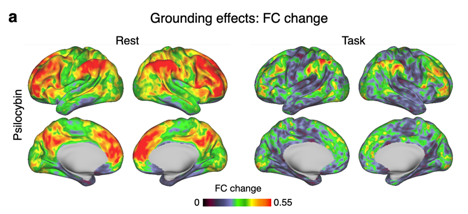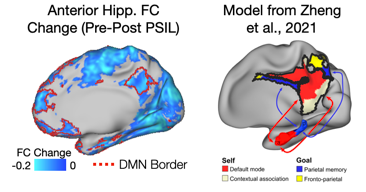After a high dose of psilocybin, the brain desynchronizes at a massive scale, causing loss of our sense of self, time, and space. This may drive the burst of plasticity caused by psychedelics. The next day, brain activity has largely returned to normal, but an echo remains – a reset of circuits critical to the sense of self.
Our study is out today in @Nature nature.com/articles/s4158…
Our study is out today in @Nature nature.com/articles/s4158…
We tracked brain changes in healthy adults before, during, and for weeks after a large dose of psilocybin, and again 6+ months later.
Psilocybin caused profound and widespread desynchronization to brain activity, altering connections across cortical networks and subcortical structures (paralleling @Carhart-Harris’s entropic brain hypothesis).
Psilocybin caused profound and widespread desynchronization to brain activity, altering connections across cortical networks and subcortical structures (paralleling @Carhart-Harris’s entropic brain hypothesis).
We saw these changes across association cortex, but strongest in the default mode network (DMN), which is connected to the anterior hippocampus and is thought to create our sense of self. The amount of change strongly predicted the intensity of the mystical experience. 

Interestingly, when participants on psilocybin were asked to focus on a simple matching task, psilocybin’s disruptive effects decreased. This suggests a neurobiological basis for grounding - connecting with physical reality during psychedelic therapy. 

Psilocybin caused a lasting decrease in connectivity between the anterior hippocampus and cortex (DMN in particular) which lasted for weeks afterwards.
Zheng et al., suggest that the anterior hippocampus-DMN circuits controls self-oriented thinking and memory. Some past studies have linked this circuit with depression.
Zheng et al., suggest that the anterior hippocampus-DMN circuits controls self-oriented thinking and memory. Some past studies have linked this circuit with depression.

It appears the massive desynchronization on psilocybin jump starts plasticity in the hippocampus and cortex. This burst of plasticity (the neurotrophic cascade) seems to be necessary and sufficient for rapid antidepressant-like effects in animal models. cell.com/cell-reports/f…
This may provide a key link between the plasticity observed at the cellular level and the rapid antidepressant response observed in recent clinical trials. jamanetwork.com/journals/jama/…
Thanks to @nytimes, @guardian, and other media outlets for their brilliant coverage of our work. A big thanks to WashU media relations and a huge thanks to our study participants, who endured a very challenging study protocol (each came in for 18 MRI visits!) nytimes.com/2024/07/17/hea…
Brilliant title @AndrewJacobsNYT.
Bonus (if you made it this far) - a blog post I wrote describing our adventure doing this study: communities.springernature.com/posts/psilocyb…
Bonus (if you made it this far) - a blog post I wrote describing our adventure doing this study: communities.springernature.com/posts/psilocyb…
• • •
Missing some Tweet in this thread? You can try to
force a refresh




